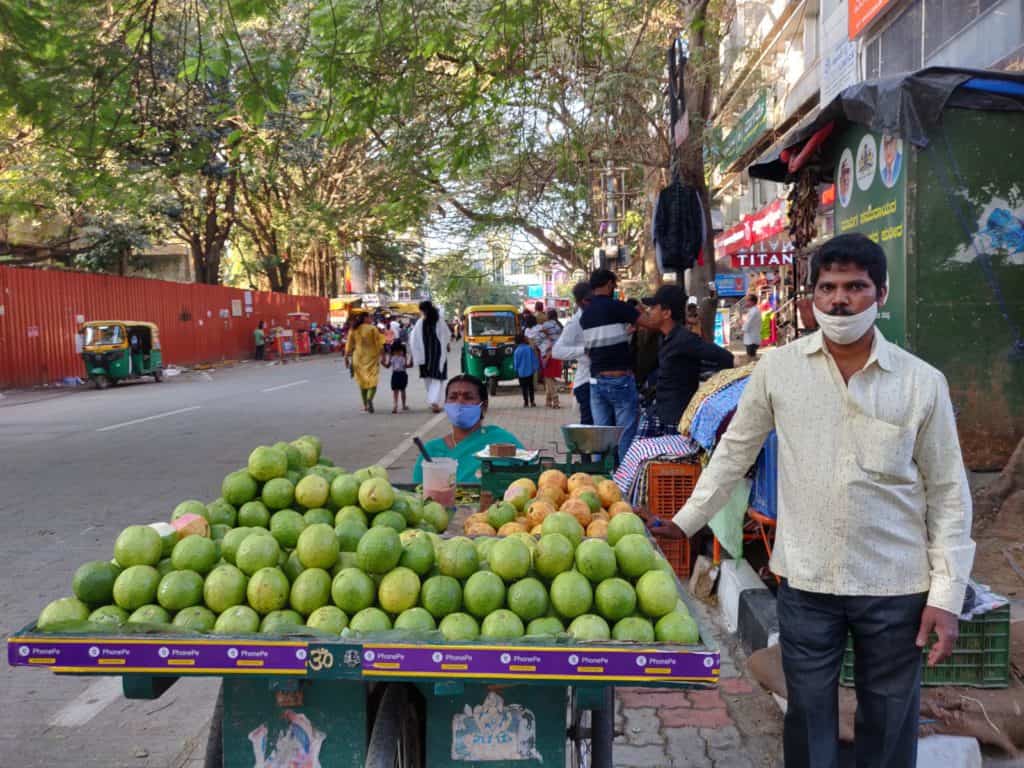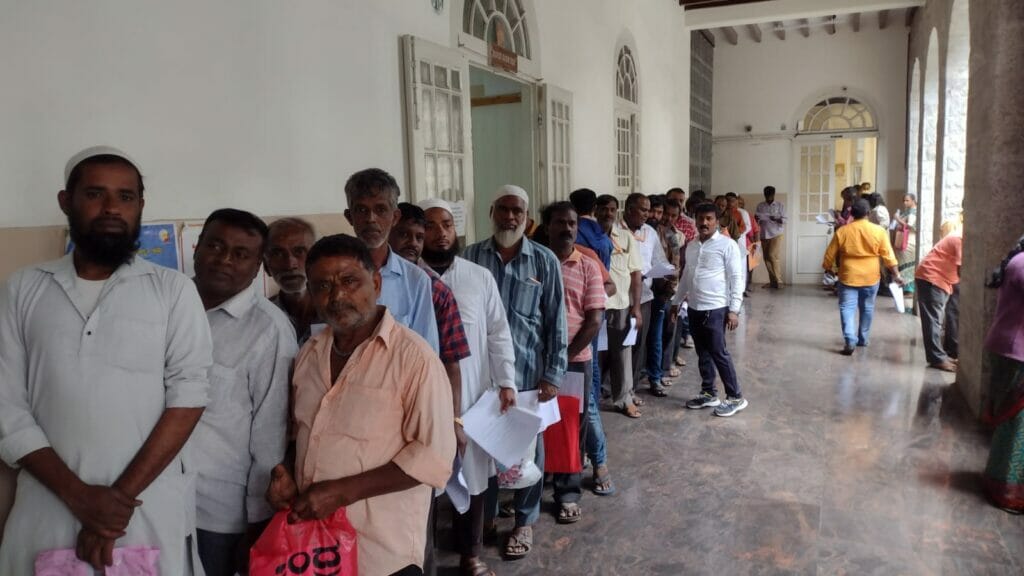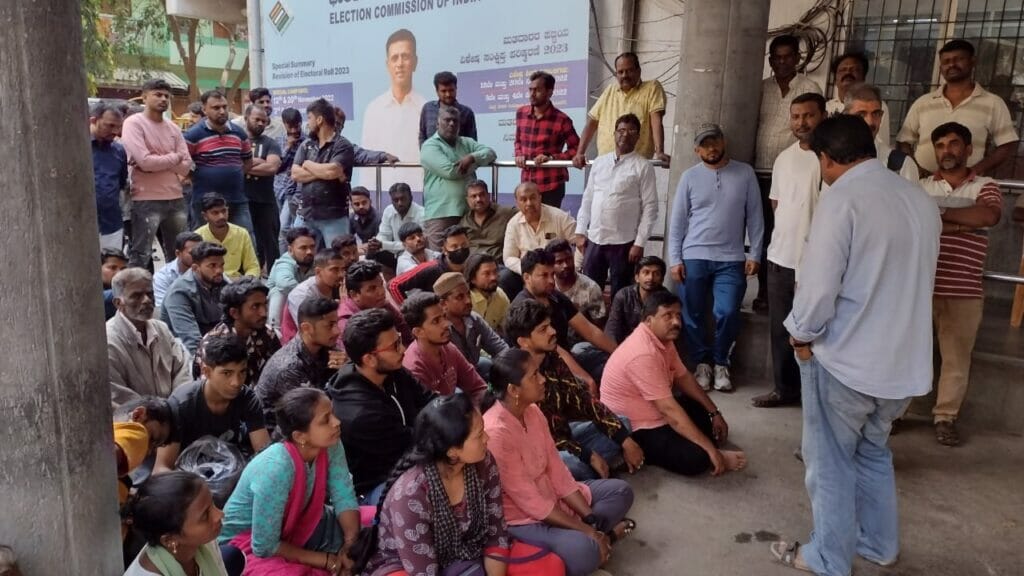Earning a livelihood in Bengaluru is becoming increasingly difficult for street vendors because of the actions and sometimes inaction of the BBMP. The civic body appears to have done very little planning to accommodate street vendors. It has even been flouting the law, according to vendors in the city.
Street vendors, who are a ubiquitous part of Bengaluru, face constant harassment from the police, resident welfare associations as well as city officials for occupying public spaces. The Street Vendors (Protection of Livelihood and Regulation of Street Vending) Act, 2014 was passed with the intention of protecting vendors from constant harassment and livelihood loss, while ensuring a better planned city.
According to the Act, urban local bodies must constitute a Town Vending Committee (TVC) with 40% of the members being street vendors, who have been elected. This committee is meant to oversee actions and decisions regarding street vendors.
The Act requires that planning authorities like BBMP conduct a survey every five years to identify all street vendors in the city, including mobile vendors who travel with their wares, and create vending zones within the city. All vendors identified in the survey must also be given licenses.
Missing vendors’ survey
BBMP conducted the first such survey in 2017 and identified 24,000 vendors in the entire city. This was a gross underestimation considering the civic body itself expected at least 2 lakh vendors in the city. Worse, only around 18,000 of these vendors were issued licenses.
Shriya Anand, Academics and Research lead at the Indian Institute for Human Settlements (IIHS), feels conducting a survey of this scale and size is a very complex undertaking. “One has to think very differently than the State does about surveys,” says the researcher who has looked particularly at how the city’s neighbourhoods impact street vendors trying to earn a living.
Street vendors are a dynamic and floating population. Mobile street vendors, who go street to street selling their goods, are even more so. “To do a survey of this sort, one has to not just walk the streets, but walk them at certain hours of the day. You can’t just go from 9 am to 5 pm,” Shriya points out.
The researcher suggests that one way to conduct a survey of such a scale is to engage in a partnership with vendor unions. “They could do some sort of a registration camp across the city,” she suggests. “The other approach is to allow street vendors to self declare with some authority and obtain the licenses,” she adds.
BBMP, however, does not appear to be interested in partnering or collaborating with street vendors. In November last year, Special Commissioner for Welfare, Ramaprasath Manohar admitted that the survey was a failure and announced that a new survey would be undertaken and completed by the end of December 2022. This would have been perfect timing as the licenses issued at the time of the previous survey were due to expire in February this year, but nothing transpired.

Vendors have no say
The Bengaluru Jilla Beedhi Vyapari Sanghatanegala Okkuta, the union of the city’s street vendors, wrote multiple letters to the BBMP urging them to begin the survey process which the civic body ignored, according to S. Babu, who heads the union. Meanwhile, the few licenses that were given out expired on February 4th. BBMP also ignored the union’s requests to extend the licenses of the 18,000 vendors until the new survey is completed, according to Babu.
The civic body neither completed the survey nor extended the existing licenses, despite a large protest by the union last week.

As per the Street Vendor’s Protection Act, the BBMP is supposed to go through the TVC, which has representation from the city’s street vendors, while designing the survey and identifying vending zones. “We were not consulted for the previous survey, and we are not being consulted today,” says Babu, who is part of the TVC.
Worse, vendors were evicted in parts of the city. On February 8th, over 100 vendors from the Jayanagar 4th block complex had their carts, stands, and goods seized by the city officials and police.
Read more: Street vendors to BBMP: cover all street vendors in surveys, issue id cards to all
The Street Vendor’s Protection Act states that vendors cannot be evicted from their area of business if urban local bodies have not conducted a survey and issued licenses. Vendors found operating without a license or in the wrong zone must be given a 30 day notice period before being evicted.
The affected vendors protested outside the South Zone Joint Commissioner’s office on February 8th. The next day, officials promised to allow them back into the complex after BBMP had determined the carrying capacity of the complex and demarcated vending zones, an exercise that they estimate will take one week. The joint commissioner refused to allow vendors to continue their business until this exercise was done, according to Babu.

“Several of the vendors are daily wage earners and a week is a long time for them to not earn a livelihood,” points out Vinay Sreenivasa, lawyer and researcher at the Alternative Law Forum. Moreover, BBMP officials and police had damaged the vendors’ carts, stands, and goods, says Babu. “The zonal commissioner promised that it would be returned,” he adds.
Following due process
Shriya points out that vending zones must also be created with a lot of care. “The law recognises the concept of natural markets. These zones cannot just be anywhere. They have to be in places that people congregate, which are already spaces for vendors to work,” she says.
Such an approach, should ideally be followed by thinking of how these zones can serve the vendors. “These zones must be able to provide vendors with basic infrastructure, like lights, water, and even storage facilities,” she adds.
Read more: “Street vendors are claimants, not intruders”
Babu points out that the BBMP’s attempt to create these zones in Jayanagar is against the law. Vending zones cannot be demarcated without first finishing the survey. “And the TVC has to decide on the zones, but the officials are saying that they will decide the zones and then get the committee to approve.”
“The city cannot do this by itself; it doesn’t have the imagination. That’s why the committee is such an important mechanism. A genuine consultative process can reveal the vendors’ needs and help the city meet them,” adds Shriya.
BBMP Special Commissioner for Welfare, Ramaprasath Manohar and South Zone Joint Commissioner, Jagadish K. Naik were both not reachable for comment.